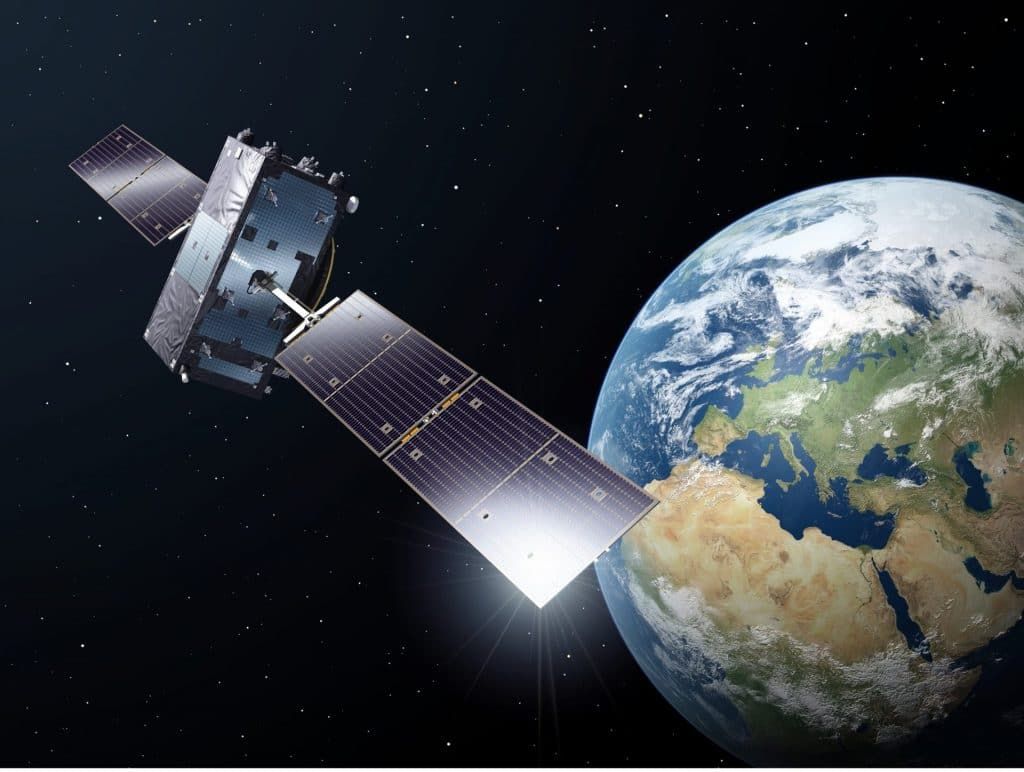In Congress, no one can hear you scream (about space)
By Jared Rosen | September 9, 2022
 Artist’s conception of Galileo satellite in orbit in 2021. Image courtesy of European Space Agency
Artist’s conception of Galileo satellite in orbit in 2021. Image courtesy of European Space Agency
Last July, Congress passed the “CHIPS and Science Act” (HR 4346), a bill that would give $52 billion to semiconductor chip manufacturers, along with other measures that include the development of fusion energy and cybersecurity programs. The CHIPS Act can relieve pressures on the semiconductor industry and other emerging technologies and includes authorization for NASA to participate in the International Space Station through September 2030 and backs the agency’s Artemis Project (which seeks to send humans to the moon and eventually set up a lunar base camp). But it lacks key pillars—contained in earlier House legislation that was discarded in favor of the CHIPS Act—that would bolster the country’s position in other arenas of space, such as security, safety and exploration beyond the two programs.
The CHIPS Act omits a piece of the now-discarded US Competes Act known as the Space Matters Act that comprehensively bolstered the US position in outer space affairs. In the recently passed CHIPS Act, just 27 out of 380 pages (60 sections in all) are devoted to NASA and outer space exploration. The Competes Act, on the other hand, contained 157 pages of new legislation to support the US role in space. There are more than 5,400 satellites orbiting our planet, and that number is expected to grow, making outer space an increasingly contested domain. Congress needs to get serious about cementing the US position in space and pass appropriate legislation lest America be left in the terrestrial dust.
To do this, Congress as a whole needs to get onboard with what was already agreed upon in the Senate last year. The Competes Act included 90 sections focusing on US activities and competition with China in outer space, but these provisions were omitted from the CHIPS Act. The text included a passage mandating that space projects funded by NASA not conduct business with entities that receive assistance from, or are more than 25 percent owned by, the Chinese government or Chinese state-owned enterprises. Space has become an increasingly competitive arena between the United States and China, the latter of which has developed sophisticated capabilities culminating in the ongoing construction of the Tiangong space station and discussion of plans to join forces with Russia to build a lunar station. As the domain has become crucial to communication for Ukraine in the midst of its war with Russia, it’s clear that maintaining a competitive edge in space is important for security purposes as well as to ensure that the United States has sustained access for exploration and myriad of other uses.
The most important omissions from this legislation, though, concern debris. Every time an object is launched into or strikes another object in space, it generates what is essentially space junk that travels at incredible speeds. In many cases, these pieces of debris collide with satellites and other objects, rendering them unusable, generating even more debris, and potentially making it too dangerous to venture into space again, a phenomenon known as the Kessler Effect. Many solutions have been proposed to rid the world of space junk, but no state has employed meaningful legislation to clean up Earth’s orbit, and there are no binding international laws to stop countries from creating additional junk. Most recently, a Russian direct-ascent anti-satellite test created a field of debris.
The Competes Act’s space legislation sought to establish “Centers of Excellence for Space Situational Awareness,” which would among other duties identify, track, predict, or classify space debris and work with other nations to do the same. The bill also required NASA to control how much debris it creates and report on ways it can support the development of mitigation technologies.
The United States can and should be a leader in making space accessible and debris-free. Today, many facets of life—from weather forecasting to travel to finding the nearest sushi restaurant—involve space in some way. If the United States is to continue using this arena, it needs to make sure satellites can orbit the Earth unharmed. While a portion of the CHIPS Act tries to achieve this through the creation of a Planetary Defense Coordination Office, that office is limited to tracking objects that are 140 meters or larger in length. Most space junk is far smaller.
Furthermore, governments are no longer solely responsible for sending objects into space, as the role of private companies in this area has grown drastically over recent years. Luxembourg’s Space Activities Act provides a good framework for the future of managing public-private partnership in space, combining tax incentives with international space diplomacy.
To remain competitive in space, the United States needs to set a clear path forward and create a system that can facilitate development for decades to come. Beyond crafting a plan for the International Space Station and backing the Artemis Project to return humans to the moon, Congress needs to think hard about the public-private relationship in space. Will space ventures become overwhelmingly company-driven endeavors, and what role will US space infrastructure play in future launches? These questions, among others, should be answered by space legislation. The Competes Act sought to outline what that future would look like by developing the infrastructure and workforce for space endeavors.
The James Webb Telescope is currently leading a promising era in space research, revealing new depths of the universe. The Artemis Project is also set to foster new international space cooperation. But how does the United States view its space endeavors in the context of its main competitors Russia and China?
Microchips alone will not bring us to the moon. Space is obviously important beyond just the desire to explore our universe. Effective policy for developing new capabilities should allow the United States to maintain a leading role beyond the confines of Earth and to facilitate a lasting program where it can reach for the stars for decades to come. That policy is best advanced through comprehensive space legislation.
Together, we make the world safer.
The Bulletin elevates expert voices above the noise. But as an independent nonprofit organization, our operations depend on the support of readers like you. Help us continue to deliver quality journalism that holds leaders accountable. Your support of our work at any level is important. In return, we promise our coverage will be understandable, influential, vigilant, solution-oriented, and fair-minded. Together we can make a difference.
Keywords: CHIPS, Congress, NASA, space
Topics: Disruptive Technologies, Technology and Security















I agree that the US needs to have effective legislation in place to mitigate the space junk problem, however, this article seems more bent on advancing legislation for an economic and military advantage for the US over China and Russia. This article spends half of its time arguing for a competitive edge over China and Russia, with little word on global cooperation (Read: military/strategic advantage). This surprises me coming from the Bulletin of Atomic Scientists. Maybe all those extra pages were left out of the current legislation for a reason – including that the US already has legislation in place… Read more »